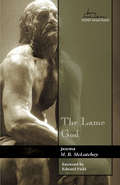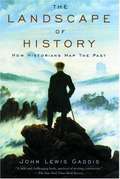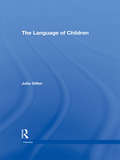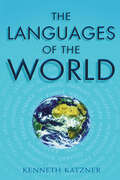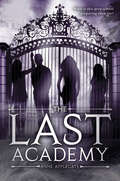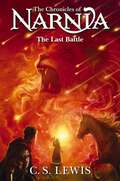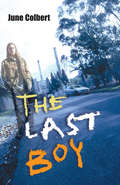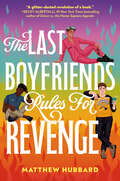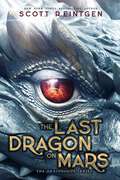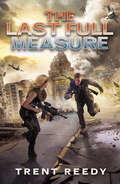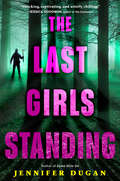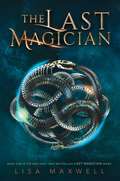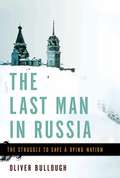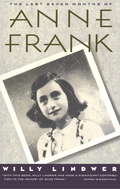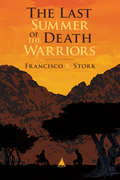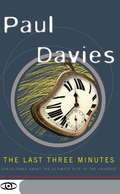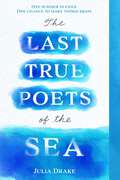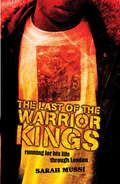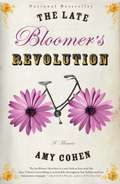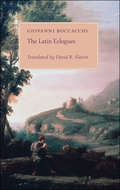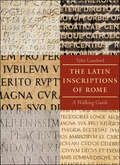- Table View
- List View
The Lame God (Swenson Poetry Award #16)
by M. B. McLatcheyWinner of 2013 May Swenson Poetry AwardIn The Lame God, author M. B. McLatchey reminds us of the inevitable bond between art and empathy. With a controlled language that finds its echo chamber in the immortal themes and characters of classical literature, this courageous work accompanies the author on her journey through a parent’s anguish in the face of a horrific crime. Using the art of poetry she gives voice to a suffering—and a love—that might otherwise go unheard. The May Swenson Poetry Award, an annual competition named for May Swenson, honors her as one of America's most provocative and vital writers. During her long career, Swenson was loved and praised by writers from virtually every school of American poetry. She left a legacy of fifty years of writing when she died in 1989. She is buried in Logan, Utah, her hometown.
The Landscape of History: How Historians Map the Past
by John Lewis GaddisWhat is history and why should we study it? Is there such a thing as historical truth? Is history a science? One of the most accomplished historians at work today, John Lewis Gaddis, answers these and other questions in this short, witty, and humane book. The Landscape of History provides a searching look at the historian's craft, as well as a strong argument for why a historical consciousness should matter to us today. Gaddis points out that while the historical method is more sophisticated than most historians realize, it doesn't require unintelligible prose to explain. Like cartographers mapping landscapes, historians represent what they can never replicate. In doing so, they combine the techniques of artists, geologists, paleontologists, and evolutionary biologists. Their approaches parallel, in intriguing ways, the new sciences of chaos, complexity, and criticality. They don't much resemble what happens in the social sciences, where the pursuit of independent variables functioning with static systems seems increasingly divorced from the world as we know it. So who's really being scientific and who isn't? This question too is one Gaddis explores, in ways that are certain to spark interdisciplinary controversy. Written in the tradition of Marc Bloch and E. H. Carr,The Landscape of History is at once an engaging introduction to the historical method for beginners, a powerful reaffirmation of it for practitioners, a startling challenge to social scientists, and an effective skewering of post-modernist claims that we can't know anything at all about the past. It will be essential reading for anyone who reads, writes, teaches, or cares about history.
The Language of Children (Intertext)
by Julia GillenThe Intertext series has been specifically designed to meet the needs of contemporary English Language Studies. Working with Texts: A Core Introduction to Language Analysis (second edition, 2001) is the foundation text, which is complemented by a range of 'satellite' titles. These provide students with hands-on practical experience of textual analysis through special topics and can be used individually or in conjunction with Working with Texts.The Language of Children: introduces the key theories of language acquisition and provides a historical overview of the subject looks at all the ways children learn to communicate, from writing and talking to playing and using computers includes a wide variety of real texts and data, from records of childrens first words to children's hand-written stories and emails explores the language of children from a range of backgrounds and abilities, including deaf and bilingual children is user-friendly and accessible, and provides a full glossary.
The Languages of the World
by Kenneth Katzner Kirk MillerThis third edition of Kenneth Katzner's best-selling guide to languages is essential reading for language enthusiasts everywhere. Written with the non-specialist in mind, its user-friendly style and layout, delightful original passages, and exotic scripts, will continue to fascinate the reader. This new edition has been thoroughly revised to include more languages, more countries, and up-to-date data on populations.Features include:*information on nearly 600 languages*individual descriptions of 200 languages, with sample passages and English translations*concise notes on where each language is spoken, its history, alphabet and pronunciation*coverage of every country in the world, its main language and speaker numbers*an introduction to language families
The Last Academy
by Anne ApplegateWhat is this prep school preparing them for?Camden Fisher arrives at boarding school haunted by a falling-out with her best friend back home. But the manicured grounds of Lethe Academy are like nothing Cam has ever known. There are gorgeous, preppy boys wielding tennis rackets, and circles of girls with secrets to spare. Only . . . something is not quite right. One of Cam's new friends mysteriously disappears, but the teachers don't seem too concerned. Cam wakes up to strangers in her room, who then melt into the night. She is suddenly plagued by odd memories, and senses there might be something dark and terrible brewing. But what? The answer will leave Cam--and readers--stunned and breathless, in this thrilling debut novel.
The Last Battle: The Chronicles of Narnia (Chronicles of Narnia #7)
by C. S. LewisIllustrations in this ebook appear in vibrant full color on a full-color ebook device and in rich black and white on all other devices.Narnia . . . where lies breed fear . . . where loyalty is tested . . . where all hope seems lost.During the last days of Narnia, the land faces its fiercest challenge—not an invader from without but an enemy from within. Lies and treachery have taken root, and only the king and a small band of loyal followers can prevent the destruction of all they hold dear in this, the magnificent ending to The Chronicles of Narnia.The Last Battle is the seventh and final book in C. S. Lewis’s The Chronicles of Narnia, a series that has become part of the canon of classic literature, drawing readers of all ages into a magical land with unforgettable characters for over sixty years. A complete stand-alone read, but if you want to relive the adventures and find out how it began, pick up The Magician’s Nephew, the first book in The Chronicles of Narnia.
The Last Boy
by June ColbertAfter fourteen-year-old Ben argues with his family, he goes to their bomb shelter, expecting his family will turn up any day to fetch him. However, his wait turns to weeks and when Ben finally emerges he finds that the world is a very different place. Green bodies litter the road, he finds references to the Last Official Day, and realises that he is alone. Living a hand-to-mouth existence and writing in his diary for company, Ben notices strange markings on the road, on fences and on his house. Someone else is alive! When this group of young survivors contacts him, Ben feels uneasy. Conditions for his entry into the group are defined and several children within the group are guarded in the way they speak to Ben. However, after becoming closer to two group members they decide to escape, as they do not like the direction the leaders are taking. One of Ben?s new friends knows something that could cost him his life and the girl has been selected for a breeding program, as girls are in short supply. Written in the form of concise journal entries, this terrifying thriller by established author June Colbert is a timely warning about where our world is heading.
The Last Boyfriends Rules for Revenge
by Matthew HubbardA queer coming-of-age about three teenage boys in small town Alabama who set out to get revenge on their ex-boyfriends and end up starting a student rebellion. Perfect for fans of Becky Albertalli and Jason June!Ezra Hayes has always felt like a background character compared to BFFs Lucas and Finley. He would do anything to be seen as a romantic lead, even if it means keeping his boyfriend, Presley, a secret. But when he discovers that Presley is a lying cheater, and his best friends are having boy problems of their own, they want revenge.Their plans to get even involve sabotaging the largest party of the year, entering a drag competition, and even having Ezra run against his ex for Winter Formal King. Then the school district starts to actively censor queer voices with their Watch What You Say initiative. Taking to TikTok to vent frustrations, Ezra begins &“The Last Boyfriends Student Rebellion.&”Between ex-boyfriend drama and navigating viral TikTok fame, Ezra realizes this rebellion is about something more important than revenge. It&’s a battle cry to fight back against outdated opinions and redefine what it means to be queer in small town Alabama.
The Last Disaster
by Hugh WaltersThe astronomers at the International Symposium were faced with an alarming discovery. An unexpectedly early solar eclipse had caused the Moon's orbit to contract. Evidence from a hurried investigation all pointed in one direction: the Moon was drawing nearer to Earth, and in five years the two would collide and both would be destroyed.What were the astronomers to do? They knew that once the news became public there would be a world-wide panic, and they turned for advice to Billy Gillanders, the head of the United Nations Exploration Agency. Gillanders and his deputy, Chris Godfrey, had one faint hope to offer, and it lay in the experiments of an eccentric retired professor...
The Last Dragon on Mars (The Dragonships Series #1)
by Scott ReintgenA boy living on Mars unexpectedly becomes a dragon rider in this first book in the sci-fi and fantasy mash-up The Dragonships series, sure to delight fans of Skandar and Eragon.Keep your eyes down and your feet moving, or this planet will rust you. That&’s what Lunar Jones tells the other kids at the relocation clinic. All of them were born on Mars, a planet that never wanted people in the first place. With resources scarce and hope even scarcer, it&’s easy to get distracted looking up. After all, their ancestors descended from the stars. Martian history always starts with Earth. The first astronauts discovered that space was already occupied. Not by little green men or flying saucers. It was full of dragons. One for every moon, every planet, every star. When humanity discovered that Earth&’s dragon had sacrificed herself to make their home planet habitable, they set their sights on Mars. If one dead dragon could breathe life into a world, why not create another one? Mankind won the war that followed, but with one catch. As the dragon died, he whispered a curse over Mars. The first settlers found their crops wouldn&’t grow. Animals hunted them. Storms raged endlessly. It took three generations to figure out the truth: Mars was doomed. Lunar knows all the old stories about dragons and space, but no one up there&’s planning to help him or his crew. Instead, he focuses on scrapping valuable gear that the storms uncover in the war zone. Until one day, a salvaging run goes wrong. Desperate to find shelter, Lunar goes underground in a restricted zone. What he finds there, buried in the Martian dust, might just be the only hope left for a dying planet.
The Last Full Measure (Divided We Fall #3)
by Trent ReedyTrent Reedy brings his action-packed, provocative trilogy about the second American Civil War to a stunning and stirring close in The Last Full Measure.In a YA trilogy like no other, Trent Reedy has raised the most primal questions of our national existence: Do we owe our greatest loyalty to our friends? Our state? Our country? Our party? How do we reconcile our individual rights and common needs? What keeps us all united -- and what happens if we fall apart?Now, in this third book, the Second Civil War has come to an end in Idaho. The Feds have taken the fight to other fronts, and Danny and his friends are free of US dominance. But that freedom comes with considerable costs, from Danny's disturbing flashbacks to the war, to the Brotherhood of the White Eagle, whose "security" for Freedom Lake looks more like outright thuggery. After Danny makes a shocking discovery about the Brotherhood's final aims, he and his friends lead a group of townspeople on a dangerous journey across a ravaged Idaho, hoping to build a better society of their own, and fulfill the dreams they had in what once was the United States.
The Last Girls Standing
by Jennifer DuganA queer YA psychological thriller from the author of Some Girls Do.&“Shocking, captivating, and utterly chilling. A delicious thriller that will have you tearing through pages to get to the end, where you won&’t be disappointed.&” —Jessica Goodman, bestselling author of They Wish They Were Us and The CounselorsSloan and Cherry. Cherry and Sloan. They met only a few days before masked men with machetes attacked the summer camp where they worked, a massacre that left the rest of their fellow counselors dead. Now, months later, the two are inseparable, their traumatic experience bonding them in ways no one else can understand.But as new evidence comes to light and Sloan learns more about the motives behind the ritual killing that brought them together, she begins to suspect that her girlfriend may be more than just a survivor—she may actually have been a part of it. Cherry tries to reassure her, but Sloan only becomes more distraught. Is this gaslighting or reality? Is Cherry a victim or a perpetrator? Is Sloan confused, or is she seeing things clearly for the very first time? Against all odds, Sloan survived that hot summer night. But will she survive what comes next?
The Last Magician (The Last Magician #1)
by Lisa MaxwellAn instant New York Times bestseller! &“Will keep you guessing until the last page.&” —Cinda Williams Chima, New York Times bestselling author A girl travels back in time to find a mysterious book that could save her future in Lisa Maxwell&’s &“splendid series opener&” (Kirkus Reviews).Stop the Magician. Steal the book. Save the future. In modern-day New York, magic is all but extinct. The remaining few who have an affinity for magic—the Mageus—live in the shadows, hiding who they are. Any Mageus who enters Manhattan becomes trapped by the Brink, a dark energy barrier that confines them to the island. Crossing it means losing their power—and often their lives. Esta is a talented thief, and she's been raised to steal magical artifacts from the sinister Order that created the Brink. With her innate ability to manipulate time, Esta can pilfer from the past, collecting these artifacts before the Order even realizes she&’s there. And all of Esta&’s training has been for one final job: traveling back to 1902 to steal an ancient book containing the secrets of the Order—and the Brink—before the Magician can destroy it and doom the Mageus to a hopeless future. But Old New York is a dangerous world ruled by ruthless gangs and secret societies, a world where the very air crackles with magic. Nothing is as it seems, including the Magician himself. And for Esta to save her future, she may have to betray everyone in the past.
The Last Man in Russia: The Struggle to Save a Dying Nation
by Oliver BulloughRussia is dying from within. Oligarchs and oil barons may still dominate international news coverage, but their prosperity masks a deep-rooted demographic tragedy. Faced with staggering population decline--and near-certain economic collapse--driven by toxic levels of alcohol abuse, Russia is also battling a deeper sickness: a spiritual one, born out of the country’s long totalitarian experiment. In The Last Man in Russia, award-winning journalist Oliver Bullough uses the tale of a lone priest to give life to this national crisis. Father Dmitry Dudko, a dissident Orthodox Christian, was thrown into a Stalinist labor camp for writing poetry. Undaunted, on his release in the mid-1950s he began to preach to congregations across Russia with little concern for his own safety. At a time when the Soviet government denied its subjects the prospect of advancement, and turned friend against friend and brother against brother, Dudko urged his followers to cling to hope. He maintained a circle of sacred trust at the heart of one of history’s most deceitful systems. But as Bullough reveals, this courageous group of believers was eventually shattered by a terrible act of betrayal--one that exposes the full extent of the Communist tragedy. Still, Dudko’s dream endures. Although most Russians have forgotten the man himself, the embers of hope that survived the darkness are once more beginning to burn. Leading readers from a churchyard in Moscow to the snow-blanketed ghost towns of rural Russia, and from the forgotten graves of Stalin’s victims to a rock festival in an old gulag camp, The Last Man in Russia is at once a travelogue, a sociological study, a biography, and a cri de coeur for a dying nation--one that, Bullough shows, might yet be saved.
The Last Seven Months of Anne Frank
by Willy LindwerThe "unwritten" final chapter of Anne Frank: The Diary of a Young Girl tells the story of the time between Anne Frank's arrest and her death through the testimony of six Jewish women who survived the hell from which Anne Frank never retumed.From the Trade Paperback edition.
The Last Summer
by Judith KinghornA sweepingly epic and gloriously intimate commercial debut - a beautiful and haunting story of lost innocence and a powerful, enduring love. Clarissa is almost seventeen when the spell of her childhood is broken. It is 1914, the beginning of a blissful, golden summer - and the end of an era. DeyningPark is in its heyday, the large country house filled with the laughter and excitement of privileged youth preparing for a weekend party. When Clarissa meets Tom Cuthbert, home from university and staying with his mother, the housekeeper, she is dazzled. Tom is handsome and enigmatic; he is also an outsider. Ambitious, clever, his sights set on a career in law, Tom is an acute observer, and a man who knows what he wants. For now, that is Clarissa. As Tom and Clarissa's friendship deepens, the wider landscape of political life around them is changing, and another story unfolds: they are not the only people in love. Soon the world - and all that they know - is rocked by a war that changes their lives for ever.
The Last Summer of the Death Warriors
by Francisco X. StorkOne is dying of cancer. The other's planning a murder.When Pancho arrives at St. Anthony's Home, he knows his time there will be short: If his plans succeed, he'll soon be arrested for the murder of his sister's killer. But then he's assigned to help D.Q., whose brain cancer has slowed neither his spirit nor his mouth. D.Q. tells Pancho all about his "Death Warrior's Manifesto," which will help him to live out his last days fully--ideally, he says, with the love of the beautiful Marisol. As Pancho tracks down his sister's murderer, he finds himself falling under the influence of D.Q. and Marisol, who is everything D.Q. said she would be;and he is inexorably drawn to a decision: to honor his sister and her death, or embrace the way of the Death Warrior and choose life. Nuanced in its characters and surprising in its plot developments--both soulful and funny--Last Summer is a buddy novel of the highest kind: the story of a friendship that helps two young men become all they can be.
The Last Three Minutes: Conjectures About The Ultimate Fate Of The Universe
by Paul DaviesRagnarok. Armageddon. Doomsday. Since the dawn of time, man has wondered how the world would end. In The Last Three Minutes, Paul Davies reveals the latest theories. It might end in a whimper, slowly scattering into the infinite void. Then again, it might be yanked back by its own gravity and end in a catastrophic "Big Crunch. " There are other, more frightening possibilities. We may be seconds away from doom at this very moment. Written in clear language that makes the cutting-edge science of quarks, neutrinos, wormholes, and metaverses accessible to the layman, The Last Three Minutes treats readers to a wide range of conjectures about the ultimate fate of the universe. Along the way, it takes the occasional divergent path to discuss some slightly less cataclysmic topics such as galactic colonization, what would happen if the Earth were struck by the comet Swift-Tuttle (a distinct possibility), the effects of falling in a black hole, and how to create a "baby universe. " Wonderfully morbid to the core, this is one of the most original science books to come along in years.
The Last True Poets of the Sea
by Julia DrakeFrom a new voice in YA literature comes an epic, utterly unforgettable contemporary novel about a lost shipwreck, a missing piece of family history, and weathering the storms of life. Fans of Far from the Tree, We Are Okay, and Emergency Contact will love this stunning debut."Profound and page-turning." --Madeline Miller, #1 New York Times best-selling author of CirceThe Larkin family isn't just lucky-they persevere. At least that's what Violet and her younger brother, Sam, were always told. When the Lyric sank off the coast of Maine, their great-great-great-grandmother didn't drown like the rest of the passengers. No, Fidelia swam to shore, fell in love, and founded Lyric, Maine, the town Violet and Sam returned to every summer. But wrecks seem to run in the family: Tall, funny, musical Violet can't stop partying with the wrong people. And, one beautiful summer day, brilliant, sensitive Sam attempts to take his own life. Shipped back to Lyric while Sam is in treatment, Violet is haunted by her family's missing piece-the lost shipwreck she and Sam dreamed of discovering when they were children. Desperate to make amends, Violet embarks on a wildly ambitious mission: locate the Lyric, lain hidden in a watery grave for over a century. She finds a fellow wreck hunter in Liv Stone, an amateur local historian whose sparkling intelligence and guarded gray eyes make Violet ache in an exhilarating new way. Whether or not they find the Lyric, the journey Violet takes-and the bridges she builds along the way-may be the start of something like survival. Epic, funny, and sweepingly romantic, The Last True Poets of the Sea is an astonishing debut about the strength it takes to swim up from a wreck.
The Last Voyage: a story of the Titanic
by Jessica StirlingThe Martindale sisters are about to embark on a reckless journey of deceit, rivalry and betrayal that reaches a thrilling and romantic climax as the Titanic sails for New York...At first, handsome, freewheeling Clive Cavendish does not appear to be an ideal catch for Julie. But when a whirlwind seduction leads to love and marriage and Clive's ambitious schemes begin to pay off Julie is more than happy to be the wife of an up-and-coming painter and the mother of his children.Anna's suitor, Howard Buskin, is rich, moody and reclusive. He prefers painting Dartmoor's brooding landscapes to courting the beautiful young woman his mother has chosen to be his bride and from the first their uneasy, loveless marriage totters on the brink of crisis.Only when American art collector Teddy Norris enters their lives with a proposal that Howard cannot ignore, and an easy-going charm that sweeps Anna into a tempestous affair, do the sisters begin to question their loyalty to their husbands and to each other. A loyalty that will be tested to the limit on the first, and last, Atlantic crossing of the White Star's new super-liner, the unsinkable Titanic - a voyage not all of them will survive.
The Last of the Warrior Kings
by Sarah MussiIt's a snowy evening, South London. From a bus, Max Wolf and his brother Angelo see a gang ominously tracking a well-known rapper, Mogul King, through the dark streets. Minutes later, Mogul King boards the bus, presses a parcel into Max's hands, exacts an incomprehensible promise, and jumps off again - to his death. The parcel contains an extraordinary ancient bronze dagger, and within hours Max is running for his own life through London, his brother, Angelo, is dead, apparently the victim of a gang drive-by shooting, and his friend, Sapphire, is next on the hit list.But everything is not as it seems. Everything leads the British Museum. Everything began with the ill-fated British Punitive Expedition of 1897 and the looting of the fabulous Benin Bronzes from Nigeria over a hundred years ago. In an intriguing dual storyline, Max's racing first person narrative story is offset by a scrap book of letters, memoirs, drawings, photos and journal entries, by one Hugh Hardy, Gunner aboard the Theseus, and foot soldier on that ruinous expedition over a century ago.
The Late Bloomer's Revolution: A Memoir
by Amy CohenThe debut of a sparkling and reassuring memoirist--an inspiration to late bloomers everywhere"I like to consider myself a late bloomer, meaning someone who will eventually, however late, come into bloom. Although when and if I will bloom remains a mystery. I wish I knew how to speak a foreign language fluently. I wish I knew how to cook a simple roast chicken, or that I had read The Idiot, whose main character sounds like someone I can relate to."In quick succession, Amy Cohen lost her job writing sitcoms, her boyfriend (with whom she'd been talking marriage), and her mom, after a long bout with cancer. Not exactly the stuff humor thrives on, is it? But filtered through Amy's worldview, there's comedy in the most unexpected places. In this unforgettable, engaging memoir, she recounts her (seemingly) never-ending search for love, her evolving relationship with her widowed dad, and her own almost unintentional growth as she stumbles through life.Filled with observations sweet, bittersweet, and laugh-out-loud funny, The Late Bloomer's Revolution will be irresistible to anyone who believes her greatest moment is yet to come.
The Latin Eclogues
by Giovanni BoccaccioGiovanni Boccaccio is famous for his masterpiece The Decameron, but his Latin Eclogues are relatively unknown. David R. Slavitt’s English translation makes these important pieces accessible to a new audience of readers. Elegant and engaging, these pastoral poems address the great issues of Boccaccio’s Italy, including the political and military intrigues of the day. Boccaccio modeled his poems on Petrarch’s eclogues and, before him, those of Virgil and Theocritus. Slavitt’s impeccable translations are highly readable, while his editorial interjections both elucidate the poet’s intended meaning and frame the poems for the reader. These charming works offer wonderful insight into daily life in Renaissance Italy. A prolific and award-winning translator, Slavitt turns the Eclogues into vibrant modern English, capturing not only the words of Boccaccio but the flavor of the original language.The availability of The Latin Eclogues in English is a major contribution to the study of the literature and history of the Italian Renaissance.
The Latin Inscriptions of Rome: A Walking Guide
by Tyler LansfordRome’s oldest known Latin inscription dates from the sixth century BC; the most recent major specimen was mounted in 2006—a span of more than two and a half millennia. Remarkably, many of these inscriptions are still to be found in situ, on the walls, gates, temples, obelisks, bridges, fountains, and churches of the city. Classicist Tyler Lansford has collected some 400 of these inscriptions and arranged them—with English translations—into fifteen walking tours that trace the physical and historical contours of the city. Each itinerary is prefaced by an in-depth introduction that provides a survey of the history and topography of the relevant area of the city. The Latin texts appear on the left-hand page with English translations on the right. The original texts are equipped with full linguistic annotation, and the translations are supplemented with historical and cultural notes that explain who mounted them and why.This unique guide will prove a fascinating and illuminating companion for both sophisticated visitors to the Eternal City and armchair travelers seeking a novel perspective into Rome's rich history.
The Latin Inscriptions of Rome: A Walking Guide
by Tyler LansfordA collection of 15 guided walking tours of the ancient Latin descriptions found throughout Rome. Rome&’s oldest known Latin inscription dates from the sixth century BC; the most recent major specimen was mounted in 2006—a span of more than two and a half millennia. Remarkably, many of these inscriptions are still to be found in situ, on the walls, gates, temples, obelisks, bridges, fountains, and churches of the city. Classicist Tyler Lansford has collected some 400 of these inscriptions and arranged them—with English translations—into fifteen walking tours that trace the physical and historical contours of the city. Each itinerary is prefaced by an in-depth introduction that provides a survey of the history and topography of the relevant area of the city. The Latin texts appear on the left-hand page with English translations on the right. The original texts are equipped with full linguistic annotation, and the translations are supplemented with historical and cultural notes that explain who mounted them and why. This unique guide will prove a fascinating and illuminating companion for both sophisticated visitors to the Eternal City and armchair travelers seeking a novel perspective into Rome's rich history.&“This book is wonderful. . . . Lansford&’s evocative depictions of monuments, cityscape, and memorable humans have inspired me anew with the fascination of Rome.&” —Mary T. Boatwright, Duke University&“If this book is not slipped into many a Rome-bound suitcase, there is no justice in the world. I can think of few more enjoyable companions on a prowl through the city.&” —Jane Stevenson, Times Literary Supplement (UK)
